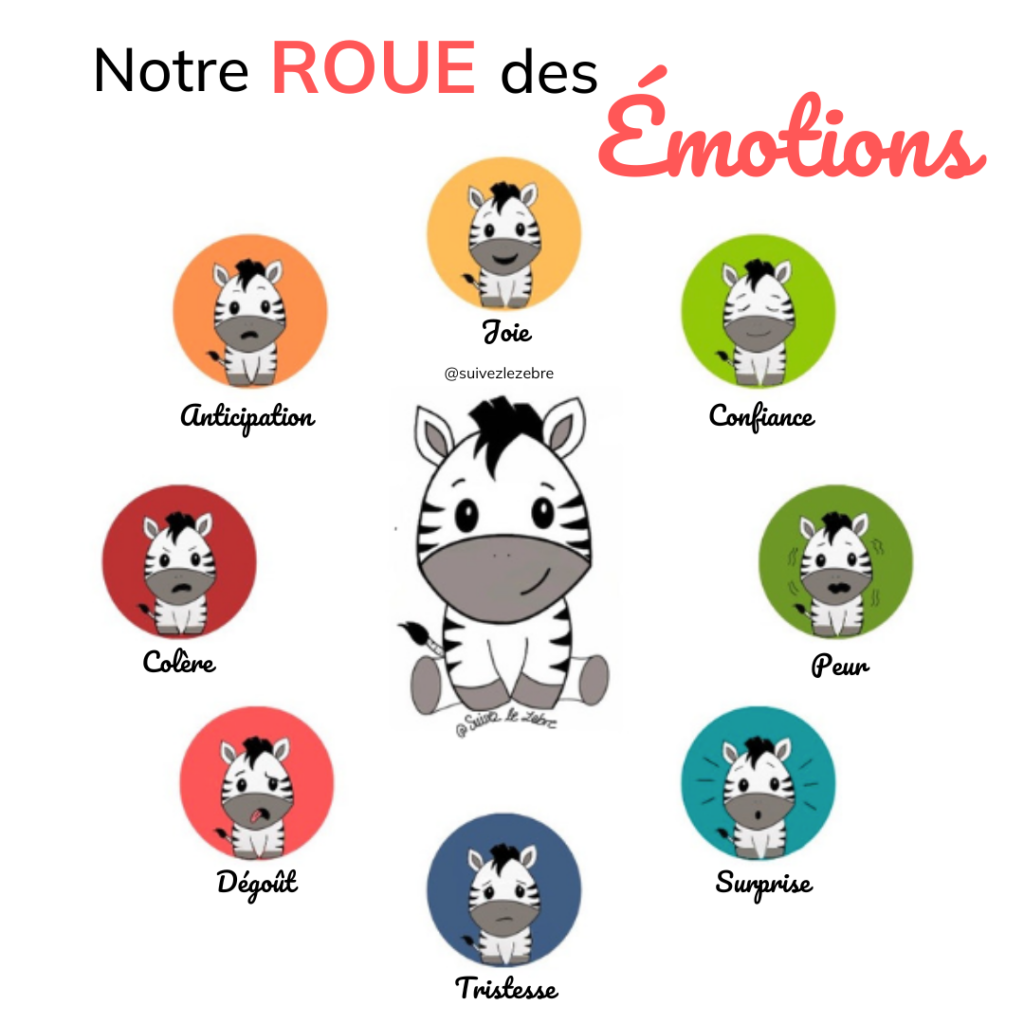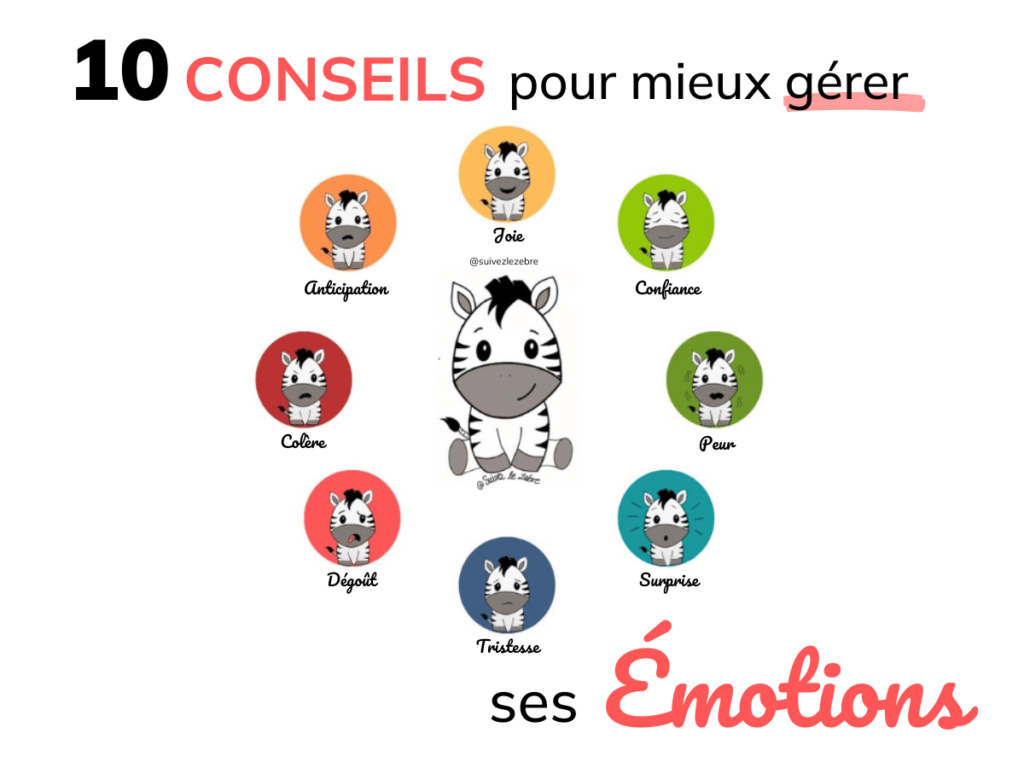Welcome to Suivez le Zèbre, the first blog to democratize Giftedness(High Learning Potential) and neurodiversity. Do you sometimes find it difficult to understand and manage your emotions? Let’s try to find solutions together.
What is emotional hypersensitivity?
If you have trouble managing your emotions, it’s probably because you’re emotionally hypersensitive.

Emotional hypersensitivity is heightened sensitivity to the emotions and feelings of others. If you’re concerned, you may feel very affected by other people’s emotions and behaviors. This can make you more vulnerable to a range of emotions, from joy and sadness to anxiety and stress.
Fortunately,emotional hypersensitivity also enables you to develop strong empathy and compassion for those around you.
Would you like to know if you could be hypersensitive? Don’t hesitate to take our test. You’ll be asked to make a symbolic contribution by offering the team a coffee (1coffee = 1 euro).
Emotional hypersensitivity in everyday life
Emotional hypersensitivity can be a challenge to manage. If your hypersensitivity is too pronounced, it’s bound to have an impact on your personal and professional life. It can be experienced as a handicap if it is misunderstood or poorly managed on a day-to-day basis.
Testimonials from emotionally hypersensitive people
Marie testifies: “I am hypersensitiveand my problem is that I tend to let myself be pushed around. I’m a real chameleon and I adapt to everything and everyone, but I tend to let myself be pushed around so that people don’t think badly of me. When, at work, my boss isn’t happy with what I’ve produced, the tears come fast. Most of the time, I try to leave and go outside to evacuate or I try to swallow them, but it’s very complicated..”
For Laura, the impact is greatest in her personal life: “In fact, the slightest negative comment at work for example, has repercussions at home, if I misinterpret a joke I could close myself for the evening. At times like this, I find it very difficult to take the first step again and try to explain what got me into this state in the first place.
The problem becomes physiological. Sometimes I feel so many emotions that I can’t speak, a knot forms in my throat and I simply can’t get a word out… I’m trying to work on it and it’s getting better and better, but I honestly think it takes time..
In Hypersensible we talk a lot about sensoriality, because it’s just as much a problem as having highly developed emotions.
Fanny Marais, specialist coach
Understanding where the term emotional hypersensitivity comes from
Let’s take a look at the definition of emotion to understand what we’re talking about.
Wikipedia definition of emotion
Theemotion (from Old French xiiie century motionfrom the Latin root emovere to set in motion, is a complex and intense psychophysiological experience with an abrupt onset and relatively short duration of a human or non-human object’s state of mind as it reacts to biochemical (internal) and environmental (external) influences.
In humans, emotion fundamentally includes physiological behavior, expressive behavior and consciousness. Emotion is associated with mood, temperament, personality and motivational disposition.
The word “emotion” comes from the French word “émouvoir”. It is based on the Latin emovere, whose e- (variant of ex-) means out of and movere means movement. The related term motivation is also derived from the word movere.

It’s interesting to see that emotion and motivation have the same root ! Intense emotions are, in a way, parallel to a power of high motivation (or, on the contrary, intense procrastination). Hypersensitives can be great procrastinators. A characteristic also found in Gifted people.
Robert Plutchik’s theory of emotions
Still according to Wikipedia: psycho-evolutionary theory of emotions of Robert Plutchik’s is one method of classifying general emotional reactions. Plutchik considered there to be eight basic emotions: joy, fear, disgust, anger, sadness, surprise, confidence andanticipation.
Plutchik believed that these emotions reflected neurotransmitter levels, a purely biological mechanism that had evolved to facilitate the animal’s reproductive adaptation. He defended their primacy, showing that each of them triggered behavior of great survival value.
For example, fear inspires the flight or fight reaction, anger inspires the defense of one’s assets (including the female), sadness implies the rest essential for the organism’s self-preservation, and joy implies the search for resources..
Plutchik’s psychoevolutionary theory of basic emotions is based on ten postulates:
- The concept of emotion applies to all levels of evolution and to all animals, including human beings.
- Emotions have evolved and taken on different forms of expression in different species.
- Emotions have played an adaptive role in helping organisms deal with key survival issues posed by the environment.
- Although forms of emotional expression vary from species to species, there are some common elements or prototypical patterns
- There are a small number of basic, fundamental or prototypical emotions.
- The other emotions are all mixed or derived states, i.e. mixtures, blend or combinations of basic emotions.
- Basic emotions are hypothetical concepts or idealized states whose properties and characteristics are derived from various manifestations.
- They can be systematized into pairs of opposing emotions.
- Emotions all vary in their degree of similarity.
- Each emotion manifests itself in varying degrees of intensity or arousal.
The wheel of emotions by Robert Plutchik
We took the time to revisit the wheel of emotions with Zack, the zebra mascot of Suivez le Zèbre.


What Plutchik says in his theory is that emotion and reason are not opposites, but complementary! Emotion aids rational decision-making. It helps you make the right choice. If you see a fire, you’re not going to run into it, but instead, as a survival reflex, go in the opposite direction.
When it interferes with every aspect of your lifehypersensitivity can be a burden, even a handicap. Whenhypersensitivity becomes so pervasive that it impacts the whole of your daily life, a few adjustments need to be considered.
How do I manage my emotions? Simply and effectively: I don’t manage them! Well, I should say, I don’t manage them any more…
Mel POINAS
Mel testifies: It’s a common misconception that people with high emotionalhypersensitivity are impulsive, short-tempered, weak, emotional and sometimes depressed, and that they have this disposition to be affected by events that others often consider insignificant! In my case, it’s just the opposite: it’s because it affects me that I’m affected!
I used to try to hide my emotions, to hold them back, as if I were ashamed of them… As if it was a weakness, something I shouldn’t confess because it wasn’t acceptable or professional… Today I know that it’s rather a strength to be able to feel all your emotions and to feel them so strongly.
I used to regard my emotional hypersensitivity as a weakness, until I realized that it was the compass that helped me make the right choices in every situation.
Mel Poinas, founder of Suivez le Zèbre
Emotions can be a major source of stress and confusion in our daily lives. We can all feel overwhelmed by our emotions at times, but there are ways of managing them effectively to improve our mental and emotional well-being.
Our 10 tips for managing your emotions and hypersensitivity
Here are a few tips for managing your emotions on a daily basis:
Tip 1: Practice mindfulness
Mindfulness is being aware of your thoughts, emotions and body in the present moment. It’s a form of meditation that allows you to focus on your bodily sensations. For example, take the time to eat mindfully in order to savour the food you’re eating. When you’re hypersensitive, the pleasure you feel is increased tenfold (especially when you eat chocolate mousse!).
Mindfulness can help you deal with your hypersensitivity on a daily basis.
Tip 2: Use stress management techniques
Meditation, yoga, cardiac coherence and other stress management techniques can help you reduce stress and negative emotions.
Tip 3: Write or say what you feel
Write down your emotions: Writing can be a useful way of releasing and understanding your emotions. Try keeping a diary or writing down your emotions when they run high.
Tip 4: Don’t hesitate to express your feelings to those around you
Talk about it: Sharing your emotions with friends, family or a therapist can help you understand them and find ways to deal with them.
Tip 5: Adopt a customized diet
A healthy diet can have a significant impact on our emotional well-being. Try to eat a balanced diet, rich in fruit and vegetables, and limiting foods high in sugar and fat.
Tip 6: Remember to get enough sleep
Get enough sleep: Lack of sleep can increase stress and negative emotions. Try to get enough sleep every night to stay fit and relaxed.
Tip 7: Take time for yourself
Find a balance between work and free time: Overwork can increase stress and negative emotions. Make sure you take the time to do what you love and relax regularly.
Tip 8: Practice sophrology
Deep breathing can help you calm down and focus on the present moment, which can help you regulate your emotions.
Tip 9: Get some exercise
Exercise and sport help reduce stress. They help regulate moods by releasing endorphins. You don’t have to be a top-level athlete – a short walk every day is all you need! You can bike or walk to work whenever possible. Take a walk at lunchtime or on the way home in the evening…
Tip 10: Adopt a pet
Animals are a great help in reducing your stress thanks to:
- physical interaction: stroking, cuddling or playing with an animal can produce a soothing physiological response, such as the release of oxytocin, a hormone associated with well-being.
- anxiety reduction: the presence of an animal can help calm nerves and reduce anxiety by providing a constant source of support and comfort.
- diverting attention: when we focus on the daily tasks involved in caring for our pet, we are able to turn our attention away from the sources of stress and tension in our lives.
- unfailing emotional support: animals can also offer unconditional emotional support, allowing us to open up without judgment or fear of rejection.
In general, animals can be powerful tools to help manage stress and anxiety by providing distraction, emotional and physical support, and a constant source of unconditional love.

At times like these, it’s important to take time for yourself.
Before or after your working day, think about taking a 15-30 minute break just for yourself in your car or on public transport. Earsmuffs, a book, some music, cardiac cohesion, a bit of meditation or sophrology, just enough time to wind down before reuniting with your loved ones. If you’re always in a rush, you won’t be able to take this time for yourself. When you’re hypersensitive, adapting your schedule is vital!
In conclusion, managing emotions can be a challenge, but there are many strategies for dealing with them effectively. Try our tips to see if you can manage your hypersensitivity better on a daily basis.
When we have difficulty managing our emotions, it can affect our day-to-day anxiety. Would you like to know your anxiety level? Don’t hesitate to take our test. You’ll be asked to make a symbolic contribution by offering the team a coffee (1coffee = 1 euro).
To go further, you can read
- The best books on hypersensitivity
- Definition and explanation of hypersensitivity
- Testimony of Simon, Hypersensitive
- Learning to manage your hypersensitivity when you have gifted
- Testimonial, pets and hypersensitivity
- Is a gifted person necessarily hypersensitive?














